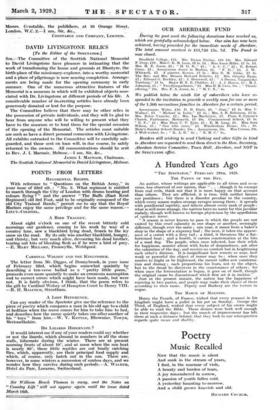A Hundred Years Ago
An author, whose writings are applicable to all times and occa- sions, has observed of. our nation, that " . . . though it be exempt from real evils, think not that it is more happy on that account than others. They are afflicted, it is true, with neither famine nor pestilence ; but there is a disorder peculiar to the country, which every season makes strange ravages among them : it spreads with pestilential rapidity, and infects almost every rank of people : what is still more strange, the natives have no 'name for this peculiar malady, though well known to foreign physicians by the appellation of epidemic terror..
" A season is never known to pass in which the people are not visited by this cruel calamity in one shape or another, seemingly different, though ever the same ; one year, it issues from a baker's shop in the shape of a sixpenny loaf ; the next, it takes the appear- ance of a comet with a fiery tail ; a third, it threatens like a flat- bottomed boat ; and a fourth, it carries consternation at the bite of a mad dog. The people, when once infected, lose their relish for happiness, saunter about with looks of despondence, ask after the calamities of the day, and receive no comfort but in heightening each other's distress. It is insignificant how remote or near, how weak or powerful the object of terror may be : when once they resolve to fright or be frightened, the merest trifles sow consterna- tion and dismay ; each proportions his fears, not to the object, but to the dread he discovers in the countenance of others ; for when once the fermentation is begun, it goes on of itself, though the original cause be discontinued which first set it in motion:"
Just at the present instant, the nation has the happiness of rejoicing in two panics, and people may make their choice of them according to their taste. Popery and Burkery are the terrors in vogue.
THE MARCH OF MANNERS.
Henry the Fourth, of France, wished that every peasant in his kingdom might have a pullet in his pot on Sunday. George the Third, of England, wished that every subject of his crown might be able to read the Bible. These desires were both well enough
in their respective days; the march of improvement has left them at such a distance ehind, that they look to our retrospective regards quite mean and shabby.
























































 Previous page
Previous page